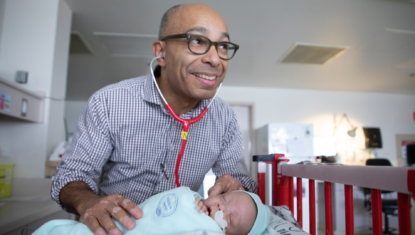16/09/2024
Ottawa, Ontario — Monday September 16, 2024

The world-first trial studying the use of mesenchymal stromal cells (MSCs) to treat bronchopulmonary dysplasia (BPD) in premature babies is gearing up for its second phase.
Dr. Bernard Thébaud was recently awarded $2.8 million from the Canadian Institutes of Health Research (CIHR) Clinical Trials Fund for the Phase 2 clinical trial, which plans to launch in spring 2025.
Very premature babies need extra oxygen and mechanical intervention to breathe. Unfortunately, this damages their lungs, causing BPD. Around 1,000 premature babies in Canada develop BPD every year, and there is no cure.
Babies with BPD often develop other chronic lung diseases, such as asthma, and may require prolonged oxygen and ventilation. They often have problems in other organs as well, such as the brain or eyes.
“This trial could change the way we care for premature babies. It’s my hope that these tiny patients will have a better chance to thrive, grow up, and have an impact on the world around them,” said Dr. Thébaud, a neonatologist and senior scientist at CHEO and the Ottawa Hospital and professor in the Faculty of Medicine at the University of Ottawa.
Dr. Thébaud’s team conducted the Phase 1 trial of MSC therapy in nine preterm babies, which was funded by the Stem Cell Network. Results of this Phase 1 trial, designed to test the safety of the therapy, are expected to be published in the coming year.
This new CIHR funding will allow the team to complete a larger randomized controlled clinical trial in eight centres across Canada, including CHEO and The Ottawa Hospital, to see whether the cells can reduce the number of days a baby needs ventilation. More time spent on a ventilator increases a baby’s risk of developing BPD and impedes brain development.
In addition to CIHR and the Stem Cell Network, Dr. Thébaud’s research on cell therapy for preterm babies has been supported by MDTB Cells GmbH, the Ontario Institute for Regenerative Medicine, The Ottawa Hospital Foundation, the CHEO Foundation and the University of Ottawa.
Photo Credit: The Ottawa Hospital
